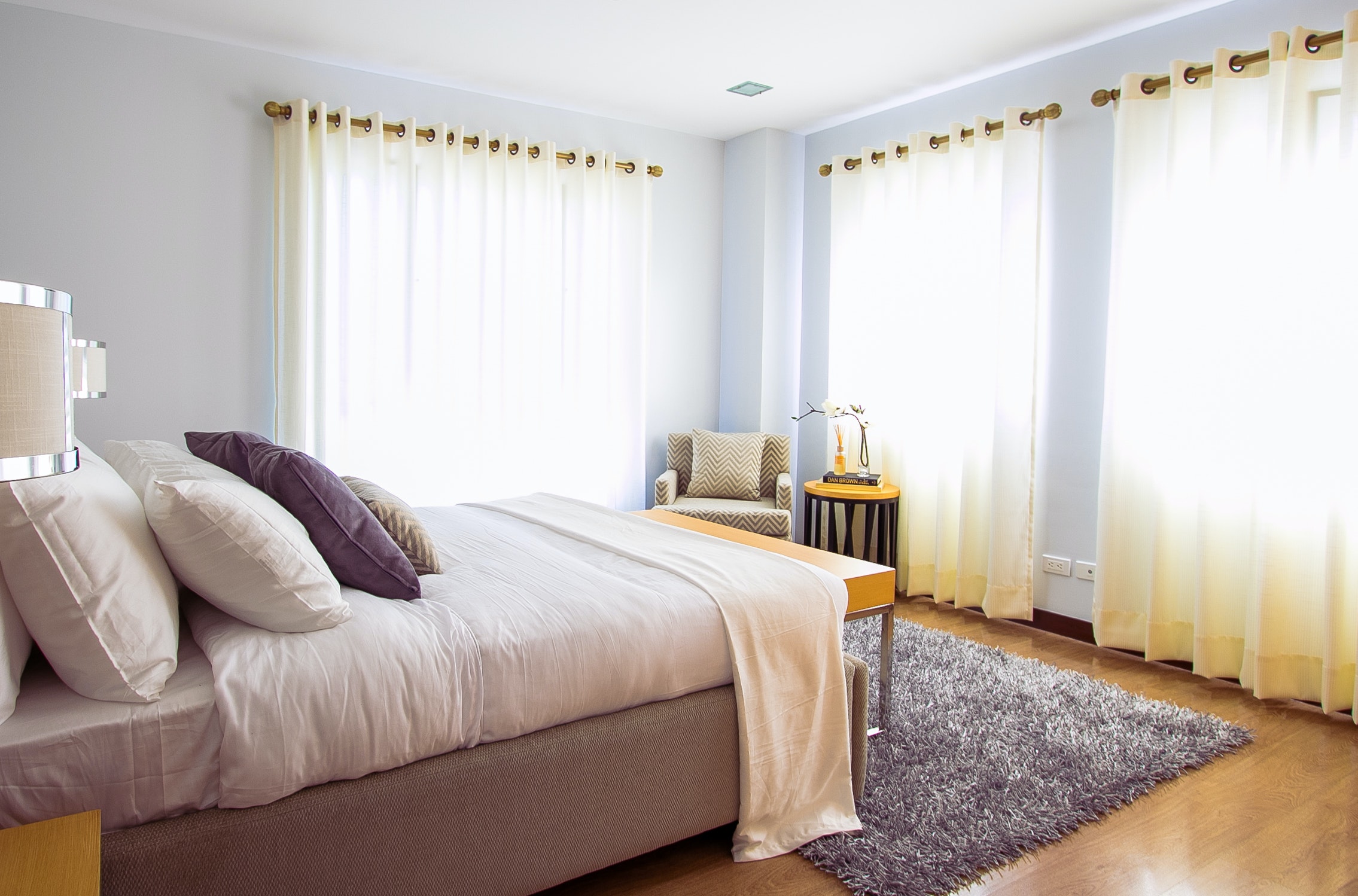It’s harder than ever to make ends meet these days, so many American workers with full-time jobs are looking for inventive ways to supplement their salaries with passive income. Collecting rent is one of the easier ways to bring in extra money at an interval you can rely on. Even if you don’t own rental property, you can still become a landlord by renting a room in your house.
Do you have a finished basement, casita, or guesthouse? Or how about just an extra room in the house that you rarely use? Maybe your kid has moved out, and you were thinking of turning their space into a craft room or an office. If you can look at that room and see dollar signs, you should really think about renting it out instead.
Of course, it differs from city to city, but the national median rent for a one-bedroom apartment in the U.S. is over $1400. The cost is more than double that in San Francisco and about half in Wichita. Almost anywhere you go, it’s challenging to find a rental for less than $1000 a month. And, of course, that rarely includes utilities, cable, and internet access.
Is Renting a Room Legal?
Before you post that “for rent” ad, you need to make sure that it’s legal to rent out a room in your home. Check your local and state laws to make sure that all your bases are covered. And, if you’re part of an HOA, then check the bylaws for any restrictions in your neighborhood. For example, many communities are cracking down on short-term rentals but may still allow rentals with a minimum 30-day stay.
Some cities limit the number of unrelated people who can legally occupy a house. And if you live in a densely populated area, there may be a limited number of on-street parking permits available for each dwelling. It’s worth doing some upfront research to determine what your local zoning laws permit.
Once you’ve done your due diligence and discover that a room rental is indeed legal, then you need to do some further research to understand exactly what your responsibilities as a landlord are. For example, it is reasonable for your tenant to expect you to maintain a clean, safe, and relatively private space in exchange for rent. That includes the upkeep of the basics, like plumbing, heating, electrical, and installing smoke and carbon monoxide detectors.
Being aware of your obligations as a landlord keeps you protected financially. In many cases, a tenant can legally withhold their rent if the unit is not properly maintained or found to be unsafe. Schedule routine maintenance for large appliances and prioritize any necessary repairs. Keep minor problems from becoming larger, more costly headaches.
Tax Implications
Passive income is still earned income that must be reported to the IRS and most states. To keep track of expenses associated with your rental, it’s a good idea to open a dedicated bank account for that reason. Maintaining separate expenses can help you minimize your angst at tax-filing time. Many everyday costs can be deducted if they are directly related to maintaining your rental. For example, after determining the square footage of the tenant’s space, do the math. If the tenant’s private living space is 25% of your home’s square footage, you may be able to deduct 25% of your expenses for the following:
- Improvements: including paint, more durable flooring, and energy-efficient windows.
- Repairs: that include plumbing, roofing, water heaters, or other services that keep your entire home more comfortable and up to code.
- Utilities: including the tenant’s percentage of basic utilities like water, gas, electricity, and trash pickup.
- Security: like monitored or DIY security systems, garage parking, and heavy-duty locks.
- Credits: for any discounts you give the tenant for completing tasks like cleaning, painting, or taking care of yard work for the entire property.
- Insurance: for your home and belongings. Check with your tax preparer because you may be able to deduct a portion of your homeowners and mortgage insurance payments at tax time.
Insurance Needs
So, speaking of insurance, do you have enough to cover your home, your belongings, and your additional unrelated renter? What about their personal belongings? Renter’s insurance is relatively inexpensive and easy to get, but you can’t assume your tenant will have it. So make sure you’re both covered.
Call your insurance representative for recommendations and purchase additional coverage if necessary. As much as we don’t like to think about it, the unexpected does sometimes happen. It’s always better to be prepared.
Listing your Room
Before you even start taking photos of your rental for the ad, make sure you have a clearly defined idea about the kind of person you want living in your house. Would you prefer a student or a retiree? Would you consider a couple or single parent with a child? How about pets? Your prospective tenant isn’t just renting a separate property from you; they’re going to be sharing your personal space.
Once you know what kind of person you’re looking for, you need to decide what details you will need to include in your listing. For example, will your tenant have kitchen privileges or access to shared outdoor space? How about parking? Are utilities and extras like Wi-Fi and cable included in the rent? Is your room furnished or unfurnished?
Tenant Screening
Require any potential renters to fill out an application and agree to a background and credit check. First, you need to verify your applicant has a steady source of income and can reliably meet their obligations. A good credit score is a plus, but not the most critical part of the process. You can easily conduct a background check online to identify any red flags that make you nervous.
Remember, this person will be living inside your house and sharing common spaces. You need to be comfortable with them for your safety. Check with previous landlords to see if there were any problems like late payments or damaged property. Be picky. Take the extra effort to find the most compatible and responsible renter.
Rental Agreements
Everyone needs to read, understand and sign a rental or lease agreement, even if the tenant is a relative or a friend. Especially if the tenant is a relative or a friend! Putting things in writing banishes ambiguity to protect both parties. It’s always best to run any legal contract by a lawyer before you sign it, but that’s not always possible. There are free online lease agreement generators that can help you find the information that you’ll need to finalize a lease agreement on your own.
Here are just a few of the most basic items that your lease agreement should include:
- Lease length: Is the lease term a year, six months, or month-to-month? You always determine the duration and should include your ability to cancel the lease under certain circumstances.
- Rental Space Details: The room being rented and a number of parking spots. If it’s on-street parking, are there permits required? Who pays for them?
- Cost: The monthly rent amount, due date, and preferred method of payment. Some landlords assess fees for late payments, so you can determine what grace period is available if any.
- Security Deposits and Move-in Costs: At the very least, you should require a security deposit that protects you from paying for any damages other than normal wear and tear. The circumstances that could cause your tenant to forfeit their security deposit should be broadly described, like carpet damage, burn marks on counters, and holes in the wall.
- Shared Space Information: Define any terms for shared spaces like laundry, kitchen, and living space. Are there any storage areas or secret laboratories that are off-limits?
- Guest Policy: Are guests allowed? If so, can they stay overnight, and where do they park?
Defining terms in great detail takes time and might feel a little awkward at first, but getting things clear from the start can help you avoid problems down the road.
Some Quick Benefits of Renting a Room
Homeowners often decide to rent a room out for additional income, but many other benefits come with a roommate, including:
- Paying off your mortgage faster
- Creating an additional income stream that can be invested in home improvement
- An extra pair of hands to help with chores
- A sense of security when you’re not alone
And Cons of Renting a Room
A roommate brings certain benefits like help with finances and even companionship. But there are also some drawbacks like:
- Incompatible personalities and annoying living habits
- Theft and damage
- Loss of personal privacy










